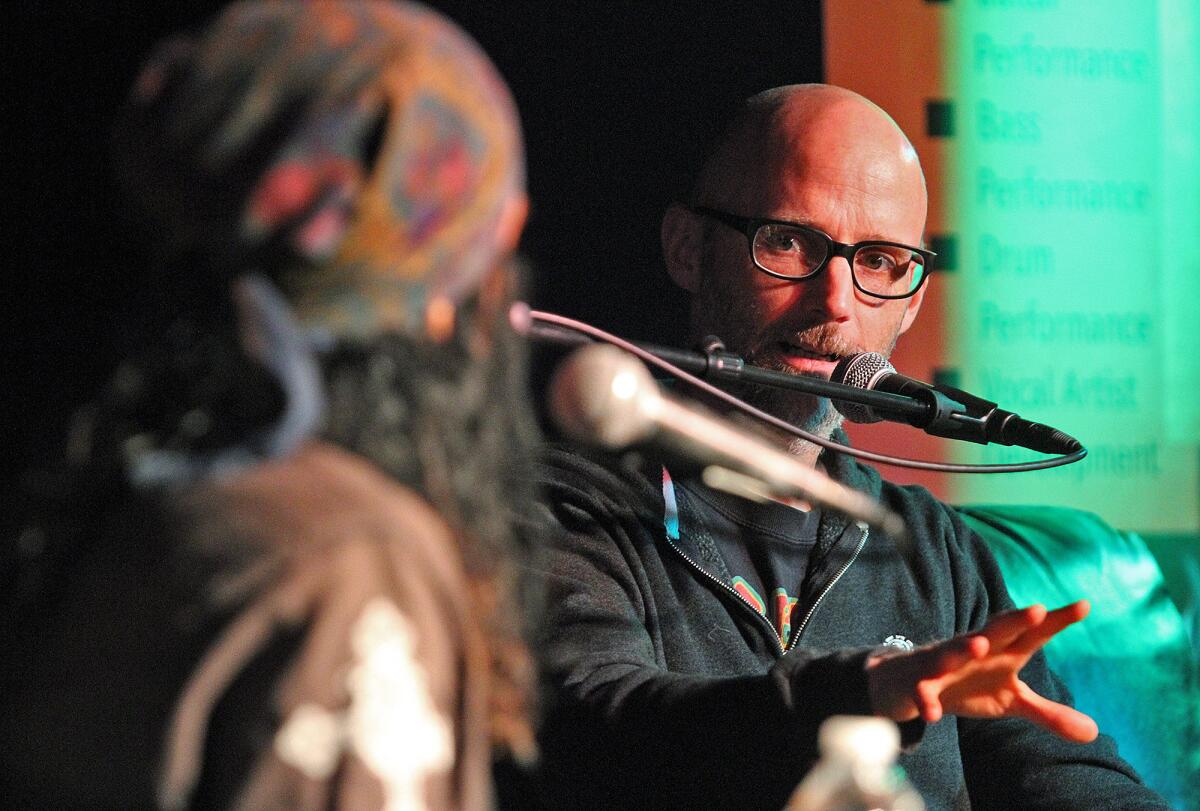Moby chats with Los Angeles Academy of Music students

For a man who’s sold some 20 million records, collaborated with the likes of Michael Jackson, Bono, Public Enemy, Lou Reed, Daft Punk and Britney Spears and revolutionized electronic dance music, Moby admits he “doesn’t have a lot to complain about… except having no hair.”
PHOTOS: Moby interviewed at Los Angeles Academy of Music in Pasadena
The admission came during an hour and a half “Let’sTalkMusic” interview session held Wednesday evening at the Los Angeles Academy of Music in Pasadena. About 150 students of the professional academy, as well as alumni and members of the public, listened attentively as the bespectacled musician-producer behind 1999’s global hit “Play” and other albums held forth on a wide range of topics. Interviewed by LAMA faculty member Native Wayne Jobson, Moby proved thoughtful and quick-witted as he answered questions about his early background, musical influences and work habits.
Born in Harlem (“one of the few skinny white kids living on 148th St.”), he was raised in affluent Darien, Conn., where he and his artist mother often borrowed money to keep themselves going. “Growing up, the idea of making and selling records wasn’t something I thought I’d ever do,” he said, though music lured him from his youngest days, and sowed the roots of his reputation as a composer and producer who brings diverse styles into his work. “As a kid, I used to steal records from my mother’s collection,” he said. “She had broad tastes, so I was exposed to a lot. But then I started borrowing from her boyfriends’ collections. If she was going with a guy who liked country music, I listened to all of his records. If it was a Hell’s Angel who liked heavy metal, I heard that.”
While much of the discussion — and many of the LAMA students’ questions — centered on professional concerns (“Why did you choose to work with producer Spike Stent on the new Innocents album?”), there was also room for humorous anecdotes and informed commentary about contemporary music and musicians. Asked about his oddest collaboration, Moby told of once accepting an assignment to write a song with Ozzy Osbourne for the soundtrack to a Beavis and Butt-head film.
“My idea was to do a song that sounded like Black Sabbath, but Ozzy wanted to do something that sounded like the Beatles. Because of personal problems, Ozzy left the project, so we got this singer — a very elegant black guy from New York who can mimic any singing style — and he did Ozzy’s part. This guy makes a very good living. Any time you hear a new track by a 70-year-old rock star who’s still hitting those high notes, it’s usually this guy.”
Asked his thoughts about musicians allowing their work to be used in commercials, Moby acknowledged that his attitude had evolved over the years. “When I was a teenager and had a punk-rock band — we were called the Vatican Commandos — my friends and I used to say we’d never sell out. I thought about this in 1995 when Range Rover asked to use a piece of mine in a commercial. But then I thought, ‘Would it be better to just say no, or would it be better to do the job and give the $150,000 I got from it to Greenpeace?’”
He opted for the latter and has since licensed several of his tracks for use in movies, TV and commercials. “When it comes to films, I would rather license something that I’ve already created than produce something new. First, all I have to do is say ‘yes,’ and second, the work remains intact. If you write music for a movie, you’ve got everyone from the director to the producer, executive producer and music supervisor who’s got input on it, and it’s just not worth it.”
Another career option Moby has lately chosen not to exercise is touring. Having performed to huge audiences around the world for the past decade, he’s presently put the prospect of traveling to play in public on hold, explaining that, “I’d rather stay home and make albums, which drives my manager insane.”
A resident of Los Angeles for three years, he savors the city not just for its being the center of the music business, but for what he calls “its vastness and incongruence. There’s no other city in the world that has, in the middle of this urban and suburban denseness, complete emptiness; in Griffith Park, there are mountain lions!”
He also spoke of his charity, MobyGratis, which offers free music to nonprofit and student filmmakers; his life as a vegan (26 years and counting); and his dream list of artists he’d like to collaborate with in the future (Prince, and British singer-songwriter James Blake). His main advice to aspiring musicians: “Two things. Learn to do everything: write, perform, engineer, produce, and, though everyone says it, love what you do.”
In conversation before the session, Moby talked about the contemporary state of the music business and his concerns for its future. “It used to be that to make music or own music, you had to have the technology that was specific to music: the recording studio, a record player. Now to make, or to own music, all you need is a laptop. So much is now dependent on this technology. Not to knock Apple, but Apple can be whimsical. What if next year they decide to switch iTunes to a streaming, cloud-based service? All of a sudden, how would the major labels sell music…?”
Moby’s appearance was the third in LAMA’s ongoing, free-to-the-public Let’sTalkMusic series. Previous guest artists were Ziggy Marley and producer Glen Ballard. For information on upcoming installments of the series, go to www.lama.edu.
--
GENE SCULATTI is a Los Angeles music journalist and the author of “The Catalog of Cool” and “100 Best Selling Albums of the 60s.”